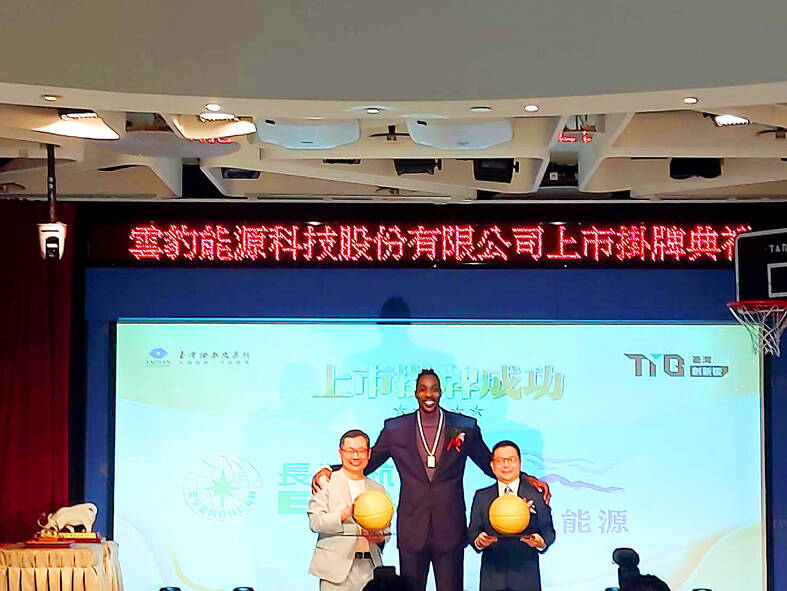Solar power developer J&V Energy Technology Co (雲豹能源) yesterday debuted its shares on the Taiwan Innovation Board (TIB), making it the second firm this year to join the start-up board of the Taiwan Stock Exchange (TWSE) after HD Renewable Energy Co Ltd (泓德能源) launched on it last week.
J&V’s shares advanced about 7 percent to NT$103 at the opening, but retreated in the session to close at NT$97 per share, just NT$1 higher than its initial public offering price of NT$96.
Launched seven years ago, J&V Energy started as a solar power developer, but has since diversified into other areas, with its energy storage business growing the fastest lately, company chairman Lai Chin-lin (賴勁麟) told a news conference in Taipei.

Photo: Chen Yung-chi, Taipei Times
The firm is building one of Taiwan’s largest fishery-and-electricity symbiosis projects, with a capacity of 128 megawatts, general manager Chao Shu-min (趙書閔) said.
The company has completed construction of 108 megawatts and would finish building the remaining 20 megawatts next month, he said.
Besides solar power, it has diversified its operations into five additional areas — offshore wind power, energy storage systems, energy trading, water treatment and biomass energy — through mergers and acquisitions, or cooperation with foreign companies and local life insurance firms, Chao said.
The company also plans to build three energy storage projects with a capacity of 100 megawatts each, at a total cost of more than NT$10 billion (US$326.6 million), it said.
However, the company faces challenges in land acquisition, intense competition, huge capital expenditures and a high debt ratio, it added.
The company’s revenue portfolio showed that infrastructure construction accounted for more than 80 percent of its revenue in 2021, while electricity sales made up the remaining 20 percent.
J&V Energy’s revenue last year rose 192 percent year-on-year to NT$6.3 billion, while net profit in the first three quarters of the year was NT$262 million, with earnings per share of NT$2.33.

When an apartment comes up for rent in Germany’s big cities, hundreds of prospective tenants often queue down the street to view it, but the acute shortage of affordable housing is getting scant attention ahead of today’s snap general election. “Housing is one of the main problems for people, but nobody talks about it, nobody takes it seriously,” said Andreas Ibel, president of Build Europe, an association representing housing developers. Migration and the sluggish economy top the list of voters’ concerns, but analysts say housing policy fails to break through as returns on investment take time to register, making the

NOT TO WORRY: Some people are concerned funds might continue moving out of the country, but the central bank said financial account outflows are not unusual in Taiwan Taiwan’s outbound investments hit a new high last year due to investments made by contract chipmaker Taiwan Semiconductor Manufacturing Co (TSMC, 台積電) and other major manufacturers to boost global expansion, the central bank said on Thursday. The net increase in outbound investments last year reached a record US$21.05 billion, while the net increase in outbound investments by Taiwanese residents reached a record US$31.98 billion, central bank data showed. Chen Fei-wen (陳斐紋), deputy director of the central bank’s Department of Economic Research, said the increase was largely due to TSMC’s efforts to expand production in the US and Japan. Investments by Vanguard International

EARLY TALKS: Measures under consideration include convincing allies to match US curbs, further restricting exports of AI chips or GPUs, and blocking Chinese investments US President Donald Trump’s administration is sketching out tougher versions of US semiconductor curbs and pressuring key allies to escalate their restrictions on China’s chip industry, an early indication the new US president plans to expand efforts that began under former US president Joe Biden to limit Beijing’s technological prowess. Trump officials recently met with their Japanese and Dutch counterparts about restricting Tokyo Electron Ltd and ASML Holding NV engineers from maintaining semiconductor gear in China, people familiar with the matter said. The aim, which was also a priority for Biden, is to see key allies match China curbs the US

STRUGGLING TO SURVIVE: The group is proposing a consortium of investors, with Tesla as the largest backer, and possibly a minority investment by Hon Hai Precision Nissan Motor Co shares jumped after the Financial Times reported that a high-level Japanese group has drawn up plans to seek investment from Elon Musk’s Tesla Inc to aid the struggling automaker. The group believes the electric vehicle (EV) maker is interested in acquiring Nissan’s plants in the US, the newspaper reported, citing people it did not identify. The proposal envisions a consortium of investors, with Tesla as the largest backer, but also includes the possibility of a minority investment by Hon Hai Precision Industry Co (鴻海精密) to prevent a full takeover by the Apple supplier, the report said. The group is